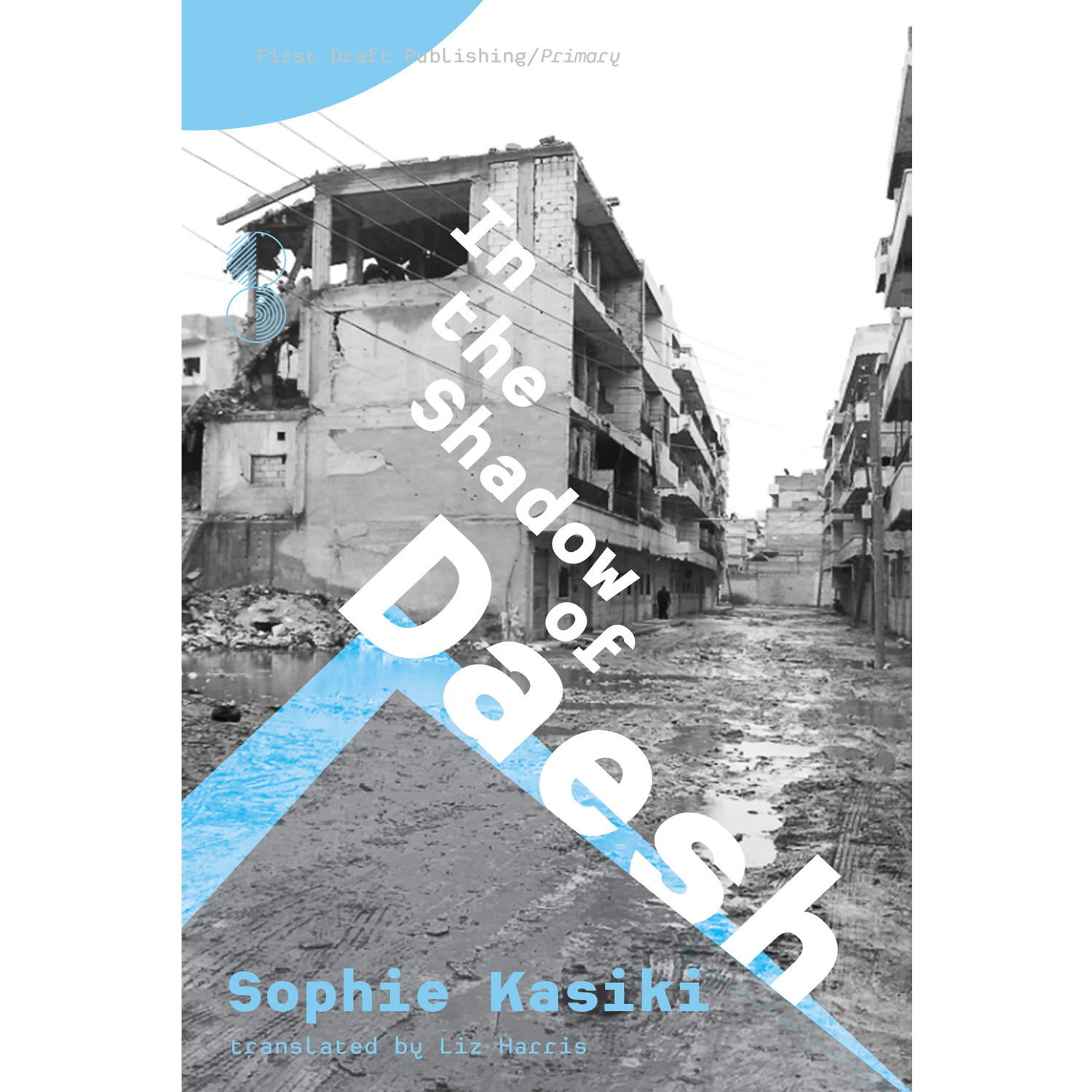In the Shadow of daesh
Author: Sophie Kasiki
Foreword author and translation: Liz Harris
Series: Primary
ISBN epub: 978-3-944214-32-0
ISBN Kindle: 978-3-944214-33-7
ISBN Paperback: 978-3-944214-34-4
Buy this book here
The so-called Islamic State of Iraq and Syria carried out acts of barbarity that horrified the most jaded of observers. So why would a woman with a good job, a loving husband and a close family leave it all behind to join them?
When three young men from the neighbourhood go to for Syria to fight for ISIS, outreach worker Sophie Kasiki finds herself supporting their distraught families. It’s not long until the three reach out to Sophie online. She agrees to talk, believing she can convince them to come back.
Instead, the opposite happens. Over the next two months, the men use their knowledge of her character and motivation to convince her to come for a short visit “to help the Syrian people.” Telling her husband she’s going to volunteer in a Turkish orphanage, Sophie leaves for Raqqa – taking their four-year-old son with her.
Swiftly disillusioned with what she sees, she tries to leave only to find herself held captive for months by her former friends and then handed over to one of the regime’s infamous “guesthouses” for women. Miraculously, she escapes to tell her story.
In the first English language account published by an Islamic State returnee, Sophie attempts to unpick the reasons why she went and to warn others from taking the same path.
Delivering Osama: The Story of America’s Secret Envoy
Author: Kabir Mohabbat and Leah McInnis
Foreword author: Graeme Smith
Series: Original
ISBN epub: 978-3-944214-29-0
ISBN Kindle: 978-3-944214-30-6
ISBN Paperback: 978-3-944214-31-3
Buy this book here
I, M. Kabir Mohabbat, acted as a secret diplomatic envoy from the United States Government to the government of the Taliban in Afghanistan. My first trip was in June 1999. My last trip began on September 5, 2001. The purpose of the trips eventually became to arrange for the delivery of Osama bin Laden into the hands of the United States using diplomatic channels. I was successful. Towards the end of February 2001, the Taliban put bin Laden under house arrest for the U.S. So why didn't we act? After September 11, 2001, I helped negotiate the capitulation of the stubborn Afghan Government to U.S. demands. This is a narrative of my attempts to secure Osama bin laden for the U.S., but it is also an insider's look at the reclusive Taliban
Taliban: A Critical History from Within
Author: Abdul Hai Mutma’in
Foreword author: Mike Martin
Series: Primary
ISBN epub: 978-3-944214-26-9
ISBN Kindle: 978-3-944214-27-6
ISBN Paperback: 978-3-944214-28-3
Buy this book here
Taliban: A Critical History from Within by Abdul Hai Mutma’in offers an inside account of the Afghan movement and their government. In his preface, the author notes that his book will please neither supporters of the Taliban nor those who fight and condemn them. It is this trenchant quality that makes it unique among the memoirs of those who used to work for and with the Taliban. Mutma’in’s account often feels like a corrective, critical of those outside the Taliban but also of the movement itself. Whereas most books of this kind stop with the invasion of the United States in October 2001, Mutma’in shares the story of how the Taliban fled, how resistance was organised and how they grew into a potent insurgency force. Mutma’in’s book is essential reading for anyone seeking to understand the Taliban and recent Afghan history.
Obedience to the Amir: An early text on the Afghan Taliban Movement
Author: Mufti Rasheed Ludhianvi
Foreword author: Michael Semple
Translation: Yameema Mitha and Michael Semple
Series: Primary
ISBN epub: 978-3-944214-22-1
ISBN Kindle: 978-3-944214-20-7
ISBN Paperback: 978-3-944214-21-4
Buy this book here
In the last year of the Taliban's government in Afghanistan, visitors to Mullah Omar's office in Kandahar received a parting gift. As they left, the movement's supreme leader asked them to take a slim volume from a pile beside the door. He told them that if they wanted to know how the Taliban were meant to behave, they should read the book. The books which Mullah Omar handed out were Pashto and Farsi translation of Eta’t Amir, or 'Obedience to the Leader'. Mufti Rasheed published the original in Urdu after having toured Taliban-run Afghanistan. Mullah Omar's endorsement indicates that he believed that Rasheed had captured the essence of the Taliban Movement. Michael Semple and Yameema Mitha have translated this important primary source and added a commentary and appraisal.
"In war, and especially guerrilla war, the best organised party is likely to win. While numbers of fighters and weapons count, organisation determines whether the leader can use them. This book is the guide the Afghan Taliban used to organise themselves differently from other Afghan groups. Anyone who wants to defeat them or negotiate with them should understand the organisational principles that guide them." -- Barnett R. Rubin, Center on International Cooperation, New York University.
An Undesirable Element: An Afghan Memoir
Author: Dr Sharif Fayez
Foreword author: Ryan Crocker
Editor: Matthew Trevithick
Series: Originals
ISBN epub: 978-3-944214-19-1
ISBN Kindle: 978-3-944214-17-7
ISBN Paperback: 978-3-944214-18-4
Buy this book here
This is the incredible story of a relentless educator named Sharif Fayez, born in 1946 in Herat, Afghanistan, who bore witness to the Communist invasion of 1979, the Iranian revolution of 1979, and who authored a ground breaking PhD dissertation that forever linked the best American poetry to Afghanistan by proving that Walt Whitman had read and been inspired by Rumi. It is the story of how Sharif pursues education above all else and becomes a professor at Kabul University only to flee illegally to Iran when the Soviets invade, where he becomes caught in the violent Islamic revolution as a professor at Mashad University. Surviving the Afghan and Iranian governments’ ruthless campaign to silence academics and their students, as well as the Iran-Iraq War, he becomes a prominent voice of resistance against the Taliban and extremism in the 1990s, writing hundreds of articles, and ultimately returns to Afghanistan as a signatory to the 2001 Bonn Conference and as the Minister of Higher Education. He completely overhauls the Afghan education system, restores co-education to the country and establishes six new universities. He is almost single-handedly responsible for the incredible strides the Afghan education system has made since 2002.
"An Undesirable Element is a fascinating tour through the tumultuous years that helped create modern Afghanistan. Fayez survived Soviet Afghanistan and revolutionary Iran, only to find himself watching from exile as his country devoured itself. Improbably, he returns after 2001 to help resurrect Afghanistan's devastated higher education system, giving an insider account of the challenges of building education in a land dominated by warlords and fundamentalism. The result is a poignant reminder of how much Afghanistan has endured, and the flicker of hope that remains despite it all." -- Anand Gopal, author of No Good Men Among The Living
"A compelling read, An Undesirable Element recounts an Afghanistan many have forgotten. It serves as a rallying cry to once again imagine all that country might be. It's a tale as extraordinary as the land from which it comes." -- Elliot Ackerman, author of Green On Blue
"An Undesirable Element moves fast as flames and offers a luminous account of the last half century of Afghan conflicts and redevelopment. Trevithick's oral history of Sharif Fayez's story is a trove: from a kiss on the head by the Afghan former King Zahir Shah, Fayez's life intersected with the future leaders and quiet supporters of his country--both heroic and tyrannical--from Columbia University to a Post-revolutionary University in Mashad, Iran. Fayez is a modest but robust storyteller whose eventual position as Afghanistan's first Minister of Education after the Taliban is only one of the strange twists and turns his story offers. His deft handling in the rebuilding of Afghanistan should be read by anyone interested in how one can use patience and determination to bring hope to a country reduced to rubble." -- Adam Klein, editor, "The Gifts of The State: New Afghan Writing"
"The term visionary tends to be misapplied to those who are merely headstrong. But it is a perfectly apt description for Sharif Fayez, the most important figure in education in 21st-century Afghanistan, yet one that history may have neglected without his memoir. Such an omission would have deprived future generations of Afghans from understanding how Fayez, perhaps more than any single person, created hope for the country’s young minds at the turn of the millennium and, in so doing, altered a nation's destiny." -- Martin Kuz, Freelance journalist
Kandahar Assassins: Stories from the Afghan-Soviet War
Author: Mohammad Tahir Aziz Gumnam
Foreword author: Dr. David Kilcullen
Series: Primary
ISBN epub: 978-3-944214-05-4
ISBN Kindle: 978-3-944214-03-0
ISBN Paperback: 978-3-944214-04-7
Buy this book here
Assassinations are a near-daily occurrence in Afghanistan. Whether by rogue Afghan security forces or by lone individuals roaming the cities and districts, the threat of a target killing is very real. Kandahar Assassins offers an unparalleled view of this phenomenon from the perspective of the assassins. Published in 1986 in Pashto and a perennial classic in Kandahar's bookstores, Kandahar Assassins tells the story of two well-known assassins who operated in the southern city during the 1980s war. The stories of 'Lame Ghazi' and Commander Ghaffari involve ambitious raids and plots carried out within the Afghan-controlled city. This book offers a corrective to the idea that assassination is a new phenomenon in Afghanistan. Mohammad Tahir Aziz Gumnam worked at a hospitel in Pakistan at the time, allowing him access to a variety of figures within the Afghan mujahedeen. Originally from Kandahar, Gumnam offers insight as an Afghan who was close to both the events and the people he describes. Judging from this book, the style and manner of assassinations in southern Afghanistan doesn't appear to have changed much. Kandahar Assassins, therefore, offers a unique perspective on the world of these target killers and how they carry out their operations. It is an essential read for any soldier serving in Afghanistan as well as those seeking to understand the history behind the current conflict. Dr David Kilcullen wrote the introduction to this English translation of the book.
"a Thousand-and-One Nights of the Afghan jihad... a detailed and lyrical account of the war that he and his contemporaries fought against in Kandahar during the 1980s" -- Dr David Kilcullen (from his introduction), counterinsurgency expert and author
I am Akbar Agha: Memories of the Afghan Jihad and the Taliban
Author: Sayyed Mohammad Akbar Agha
Foreword author: Anand Gopal
Series: Originals
ISBN epub: 978-3-944214-10-8
ISBN Kindle: 978-3-944214-08-5
ISBN Paperback: 978-3-944214-09-2
Buy this book here
Following in the tradition of Mullah Zaeef’s My Life With the Taliban, Akbar Agha’s memoir tells a story of war, friendship and political intrigue. Starting in 1980s Kandahar, the difficulties and successes of the mujahedeen come through clearly as Akbar Agha struggles to administer a group of fighters. He details the different groups fighting in Kandahar, their cooperation and the scale of the Soviet Union’s efforts to crush them. Not directly a participant in the Taliban government that ruled post-1994, Akbar Agha offers a sometimes-critical account of the administration built by many of his former fighters. After the fall of the Islamic Emirate in 2001, Akbar Agha was involved in the Jaish ul-Muslimeen opposition group and for the first time he has revealed his account of what happened in the kidnapping of UN aid workers. I Am Akbar Agha ends with an analysis of the problems afflicting Afghanistan and outlines a vision for the political future of the country post-elections and post-2015. Anand Gopal has written an introduction to the book.
"Mandatory reading" -- Graeme Smith, Senior Analyst for Afghanistan







